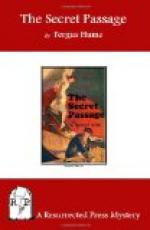“No. I never drink when on—ah—er—pleasure,” said the other, substituting another word since the servant was in the room. “Well,” he asked when the door closed, “why did you wish to see me?”
“To ask if you remember a coining case that took place some twenty years ago?”
“No. That was before my time. What case is it?”
“Some people called Saul were mixed up in it.”
“Humph! Never heard of them,” said Jennings, lighting his cigarette, “but it is strange you should talk of coining. I and several other fellows are looking for a set of coiners now. There are a lot of false coins circulating, and they are marvellously made. If I can only lay my hands on the coiners and their factory, there will be a sensation.”
“And your reputation will be enhanced.”
“I hope so,” replied the detective, reddening. “I want a rise in my salary, as I wish to marry. By the way, how is Miss Saxon?”
“Very well. You met her, did you not?”
“Yes! You took me to that queer house. What do they call it? the—’Shrine of the Muses’—where all the sham art exists. Why do you look so grave, old boy?”
The two men, getting more confidential, were dropping into the language of school-days and speaking more familiarly. Mallow did not reply at once, as his servant had just brought in the coffee. But when each gentleman was supplied with a cup and they were again alone, he looked gravely at Miles. “I want to ask your advice,” he said, “and if you are my friend—”
“I am, of course I am.”
“Well, then, I am as interested in finding out who killed Miss Loach as you are.”
“Why is that?” demanded Jennings, puzzled.
“Before I answer and make a clean breast of it, I should like you to promise that you will get no one I know into trouble.”
Jennings hesitated. “That is a difficult matter. Of course, if I find the assassin, even if he or she is one of your friends, I must do my duty.”
“Oh, I don’t expect anything of that sort,” said Mallow easily, “but why do you say ‘he’ or ’she’?”
“Well, the person who killed Miss Loach might be a woman.”
“I don’t see how you make that out,” said Cuthbert reflectively. “I read the case coming up in the train to-day, and it seems to me from what The Planet says that the whole thing is a mystery.”
“One which I mean to dive into and discover,” replied Miles. “I do not care for an ordinary murder case, but this is one after my own heart. It is a criminal problem which I should like to work out.”
“Do you see your way as yet?” asked Cuthbert.
“No,” confessed Jennings, “I do not. I saw the report you speak of. The writer theorizes without having facts to go on. What he says about the bell is absurd. All the same, the bell did ring and the assassin could not have escaped at the time it sounded. Nor could the deceased have rung it. Therein lies the mystery, and I can’t guess how the business was managed.”




